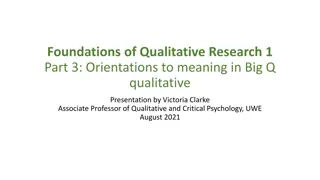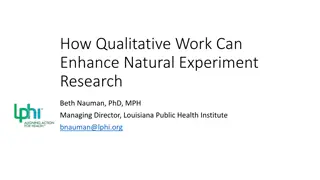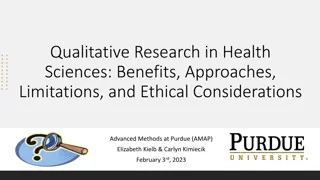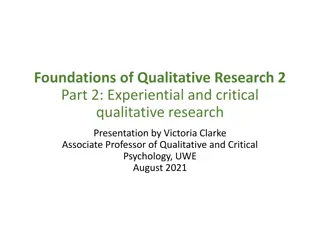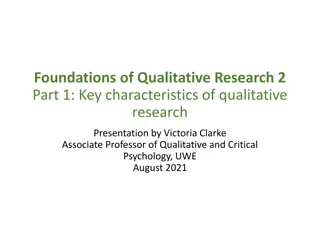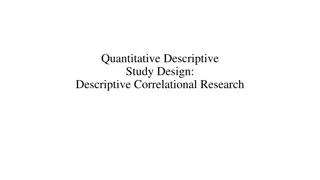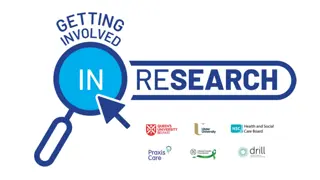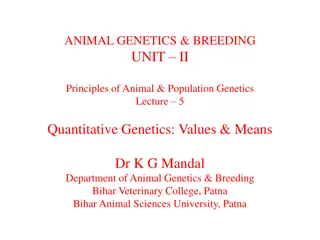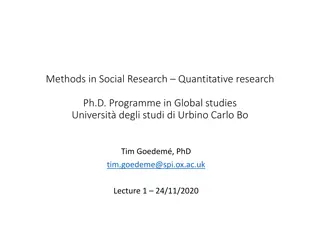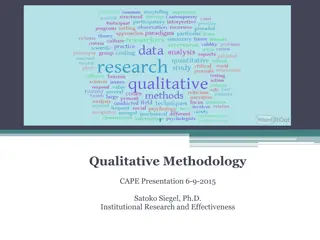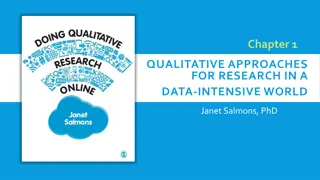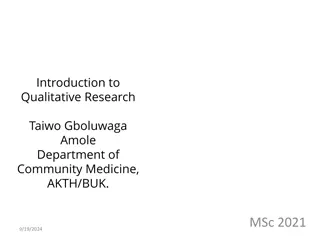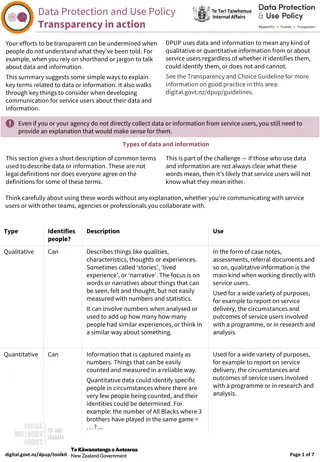Understanding Quantitative and Qualitative Research Methods
Exploring the differences between quantitative and qualitative research methods, this content delves into the importance of qualitative research, various methodologies such as focus groups and interviews, data collection, research ethics, and analysis techniques. It also covers the elements of the research process for both quantitative and qualitative approaches, highlighting the contrasting features and approaches involved.
Download Presentation

Please find below an Image/Link to download the presentation.
The content on the website is provided AS IS for your information and personal use only. It may not be sold, licensed, or shared on other websites without obtaining consent from the author. Download presentation by click this link. If you encounter any issues during the download, it is possible that the publisher has removed the file from their server.
E N D
Presentation Transcript
What We Will Cover Today. The differences between quantitative and qualitative research methods The importance of qualitative research Deep dive into the different methodologies focus groups, interviews, ethnography Collecting qualitative data research ethics Qualitative data analysis reflexive thematic analysis
Getting to Know You Who has conducted qualitative research before? Who has never considered qualitative research and why? Who is considering qualitative research to answer future research questions? What promoted you to come to this workshop on qualitative research?
Quantitative vs Qualitative Research Quantitative research uses data containing numbers to count, examine and interpret relationships, associations, causality, and differences between groups. Qualitative research uses data containing words to explore, observe, and interpret individuals experiences. Qualitative research is subjective and uses very different methods of collecting information. The nature of this type of research is exploratory and open-ended.
Elements of the Research Process: Quantitative Deductive thinking THEORY HYPOTHESIS OBSERVATION CONFIRMATION
Elements of the Research Process - Qualitative Inductive thinking OBSERVATION PATTERNS HYPOTHESIS THEORY
QUANTITATIVE QUALITATIVE Research process is inductive. Document social reality, meaning is constructed. Focus on in-depth meaning. Values are present & explicit (reflexivity). Contextual dependence. Few cases. Research process is deductive. Measures objective facts. Focus on variables. Firewall between research process and researchers values. Cross-contextual. Many cases.
QUANTITATIVE QUALITATIVE Statistical analysis. Thematic analysis. Highly structured research process. Loosely structured research process. Particularistic, specific. Holistic perspective . Separation from data. Intimacy with data. Generalise to population Generalisation to properties and contexts
Qualitative Research: Strengths Explores in-depth feelings, motivations, opinions, experiences, perceptions, understanding, meaning. Provides insights into real-life situations that you are unable to measure in a laboratory or using a survey. Compliments quantitative analyses (e.g. an open-ended question in a survey asking why the selection was chosen
Qualitative Research: Weaknesses Generalisability Volume of data Most researchers will need to unlearn quantitative habits/terminologies Time-consuming transcription Complexity of analyses
Different Types of Qualitative Research Interpretive Critical Research Phenomenological Grounded Theory Postmodern Research Case Studies
Interpretive Explores how people make meaning of a situation or event. Collect data from interviews, focus groups, observations, or content (explore writing or social media posts). Analyse patterns or common themes The outcome is a rich descriptive account that makes reference to the literature that helped frame the study. Can you provide an example of research question that could be answered using this type of qualitative research?
Phenomenological Explores an individuals lived-experience of an event or phenomenon. The researcher attempts to acknowledge their own attitudes, biases, beliefs, judgements regarding the phenomenon, allowing the researcher to see the phenomenon intuitively from the perspective of the individual. Reflexive thematic analysis (Braun and Clarke 2006, 2019, 2021, 2022) Can you provide an example of research question that could be answered using this type of qualitative research?
Grounded Theory Explores a theory that is grounded in the data. The method involves comparing units of data against one another until categories, properties, and hypotheses that state relations between these categories and properties are identified. These hypotheses are tentative and suggestive, not tested in the study. Can you provide an example of research question that could be answered using this type of qualitative research?
Case Studies A descriptive intensive analysis of one individual, unit, or phenomenon selected for its typicality or uniqueness. Different methods could be used to conduct this analysis, but the focus is on the unit of analysis. Case studies are commonly analysed in groups, but can be just one case study if there is no other occurrence of this phenomenon. For example: Phineas Gage who had a steel rod pass through his prefrontal cortex, impacting his personality. Can you provide an example of research question that could be answered using this type of qualitative research?
Critical Research Critiques the social, cultural, and psychological assumptions regarding present day contexts with the goal of empowering individuals and enabling change. It challenges current power distributions and the status quo, as opposed to merely revealing meaning. Research questions may address race, gender, and class influences, how current power structures may serve some groups interests and oppress others, and how truth and knowledge are constructed. Can you provide an example of research question that could be answered using this type of qualitative research?
Postmodern Research Challenges the form and categories of traditional qualitative analysis. Involves questioning certainties and assumptions in the world including the nature of truth, the ability of research and science to discover this truth, and all generalisations and typologies. Three crises have resulted from these questions o Can the experience of another be captured or is it created by the researcher? o Can any study be viewed as valid if traditional methodologies are flawed? o Is it possible to institute any real change?
Reflexivity Qualitative research is very practical, logical, and critical of itself. Researchers constantly ask, Am I accurately depicting the social world given the ways I am collecting and analysing my data? Good qualitative research is often the most rigorous, difficult research.
Reflexivity Reflexivity involves the researcher reflecting on how they are positioned in relation to the research and the participants. A reflexive journal should be kept from inception of the project until the research is published. Noting: gender, social privilege, sexuality, race, age immigration status, beliefs about gender and queer theory, abortion, feminism, racism, white male privilege, indigenous and disability rights, political leanings, euthanasia, the sex industry.
Reflexivity Exercise For the next 5 minutes think about how you are positioned in relation to your research and write down your beliefs, morals, opinions, and perspectives and how they could influence the research design, data collection, interaction with participants, data analysis and report writing. Noting: gender, social privilege, sexuality, race, age, immigration status, beliefs about gender and queer theory, abortion, feminism, racism, white male privilege, indigenous and disability rights, political leanings, euthanasia, the sex industry.
Qualitative Methods When should I use qualitative methods? When variables cannot be quantified; When variables are best understood in their natural settings; When variables are studied over real time; When studying intimate details of roles, processes, and groups; When the paramount objective is understanding .
Qualitative Methods What skills do I need? Must have requisite knowledge and skills about methodology, setting and nature of the issue. Must be familiar with own biases, assumptions, expectations, and values. Must be empathic, intelligent, energetic, and interested in listening. Must be open to embracing multiple realities. Must be prepared to produce detailed, comprehensive, and sometimes lengthy reports.
Qualitative Methods Qualitative research quickly exhausts resources and time. Therefore, it is ideal to limit the amount of data collected. It s not the size that matters, it s what you do with the data. Be very clear about the research focus. Write down your foggy ideas and then get more specific. Concentrate on most important issues and not others. Start writing specific questions you want to answer.
Qualitative Methods Interviews Focus Groups Ethnography Auto-Ethnography Content Analysis
Interviews A conversation on a given topic between a respondent and an interviewer Used to obtain detailed insights and personal thoughts. Flexible and unstructured, but usually with a semi-structured interview guide. Purpose: To probe informants motivations, feelings, beliefs. Lasts about an hour. Interviewer creates relaxed, open environment. Rapport building important. Wording of questions and order are determined by flow of conversation Interview transcripts are analysed for themes and connections between themes Can you provide an example of research question that could be answered using this type of qualitative research?
Advantages Tendency to have a freer exchange. Can probe potentially complex motivations and behavior. Easier to attach a particular response to a respondent. Good to use when the topic is sensitive and participants may not share in a group setting.
Disadvantages Qualified interviewers are expensive. Length and expense of interview often leads to small sample. Transcribing many interviews is also time intensive. Subjectivity and fuzziness . Social desirability bias.
Focus Groups A loosely structured interview conducted by a trained moderator among a small number of participants simultaneously 8 - 12 members. Incentives and refreshments often offered for participation. Conversational style between participants. Very little contribution from the facilitator. Facilitator guides the conversation if it goes off track and ensures everyone gets to speak. 60 to 90 minutes. Video or audio recorded. Can you provide an example of research question that could be answered using this type of qualitative research?
Advantages Richness of data from conversation, rather than question and answer style. Ability to study special populations. Easily understandable. Flexibility in covering complex topics. May uncover unanticipated ideas that are important. Usually a first exploratory step before survey construction. Gives flesh and connectedness to real people and the way they communicate. Group synergy. Faster to transcribe than multiple interviews.
Disadvantages Lack of generalisability (small sample size) although this is not seen as a weakness in quali research. Social desirability bias. Subject to research interpretation. Reflexivity very important at all stages. Cost-per-respondent is high (compared to surveys). Results dependent on skill of moderator in running the group and interpreting the analysis. may be the response in the moment which may change over time. strong personalities are a hazard people who take over the conversation. Group think
Ethnography Common in anthropology and psychology - studying human society and culture. Uses of a socio-cultural lens through which the data are interpreted. Extensive fieldwork is usually required in order to give a cultural interpretation of the data and immersion in the culture is common. A description of the culture (the beliefs, traditions, practices, and behaviors of a group of individuals) and an interpretation of the culture through the point of view of an insider to that culture are necessary components of ethnographies. Can you provide an example of research question that could be answered using this type of qualitative research?
Auto-Ethnography An autobiographical research study. The researcher experiences the phenomenon of interest and connects personal experiences to wider cultural, political and social meaning. Uses deep and careful self-reflection (reflexivity even more important). Strives for social justice and making the world a better place. Usually a rich description of lived-experience from a marginalised research individual. Can you provide an example of research question that could be answered using this type of qualitative research?
Advantages Can provide rich lived experience that no other research method could provide. Ability to research groups/cultures that have never been researched before (e.g. gut microbiome of native populations that have never been exposed to the Western Dietary Pattern). Ability to understand marginalised groups from the inside
Disadvantages Highly reliant on researcher interpretation. Can take years for the researcher to integrate into the culture/group. In some instances can be dangerous or call to question researcher confidentiality and ethical practices (e.g. a researcher integrating into a drug ring will do drugs, sell drugs, and other illegal activities).
Narrative/Content Analysis Involves the use of stories or life narratives, first person accounts of experiences. These stories are used as data, taking the perspective of the storyteller, as opposed to the larger society, with the goal of extracting meaning from the text. Content from social media a common source for content analysis, where people s ideas, experiences and opinions are generally less filtered than other forms of research. Involves analysing internal thoughts and motivations OR written text or spoken words for the component parts or patterns. Can you provide an example of research question that could be answered using this type of qualitative research?
Advantages Useful for gathering information not commonly accessed by other research methods books, social media, historical records, drawings, diaries. Cost and time-effective data collection. Best way to access individuals real un-filtered experiences and beliefs. A great way to compare things from the past.
Disadvantages Data analysis can be time-consuming if there is a lot of content to analyse. Susceptible to researcher bias and interpretation. Researcher unable to control the dialogue or topic being asked as it has been done in the past. Information could be lost or tampered with over time. May miss the initial context that produced the text.
Analysing Qualitative Research Narrative and Content Analysis the study of patterns of communication in text. Discourse Analysis the study of verbal coherent sequences of sentences. Grounded Theory coding categories Thematic Analysis identifying, analysing and interpreting patterns of meaning.
Reflexive Thematic Analysis The most common form of analysis in qualitative research. Focuses on examining themes and patterns of meaning within data. Also a large focus on the advantage of the reflexivity of the researcher. Braun and Clarke developed six systematic stages to conduct thematic analysis.











